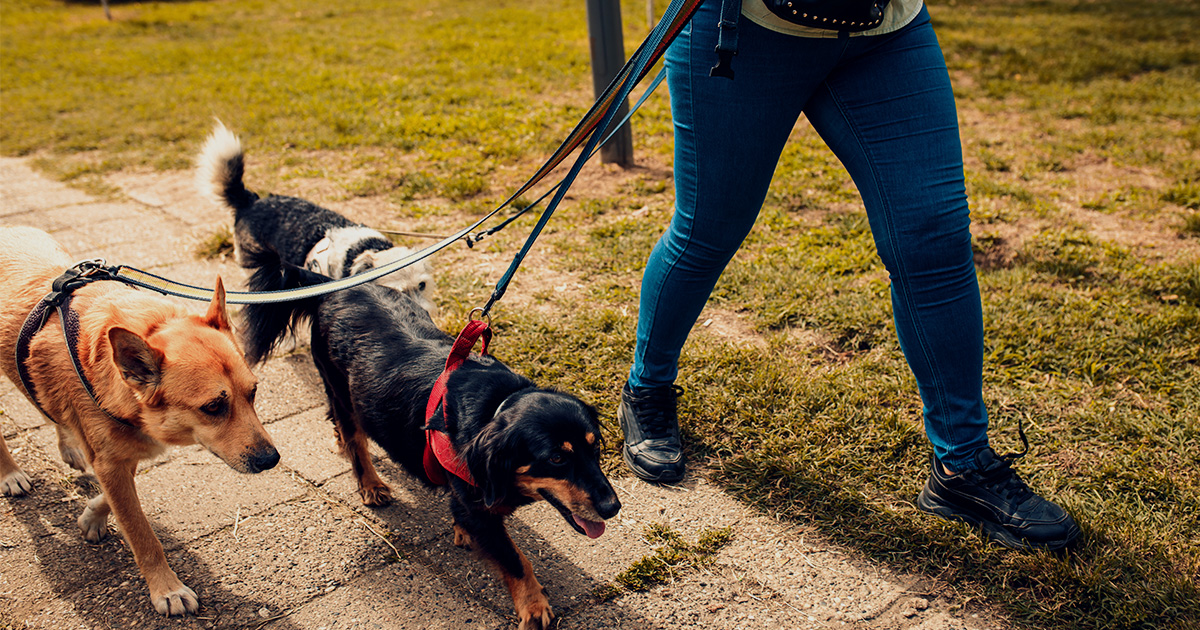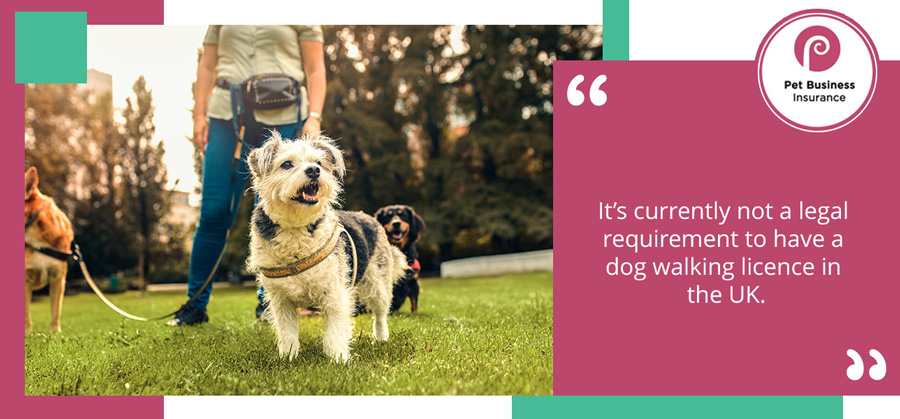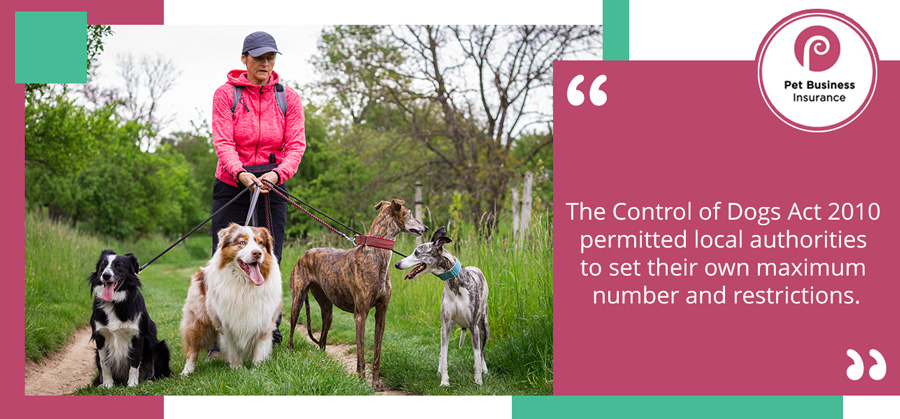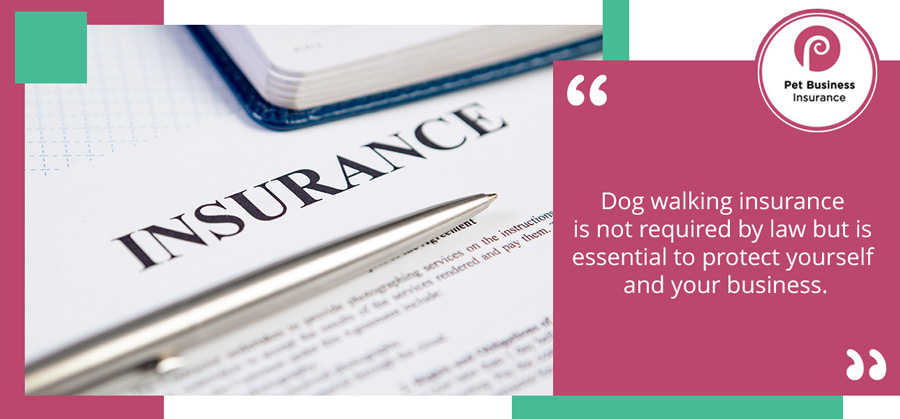
Brits are indisputable dog lovers, with over 13 million dogs in the UK and approximately 34% of UK households owning at least one canine chum. This means that there is high demand for professional dog walking services across the UK.
As a professional dog walker, it’s important that you familiarise yourself with any dog walking rules and regulations that may impact your dog walking business.
What are the dog walking laws in the UK?
Here are the primary laws to keep in mind when running a dog walking business:
- The Clean Neighbourhoods and Environment Act 2005 You could be fined up to £1,000 if you: fail to pick up faeces, fail to keep a dog on a lead or only put it on the lead when directed to do so, or allow a dog to enter land from which dogs are excluded.
- The Control of Dogs Order 1992 All dogs in a public place must wear a collar with the owner's name and address on a tag.
- The Dangerous Dogs Act 1991 It is against the law for a dog to be ‘dangerously out of control' in a public place. The Kennel Club says something as simple as the dog chasing, barking at or jumping up at a person or child could lead to complaints, so it’s important to make sure dogs are under control at all times.
- The Road Traffic Act 1988 Dogs must be on a lead at all times on roads. If the dog you are walking is injured in a car accident, it is up to the driver to stop and give their details to you.
- Dogs (Protection of Livestock) Act 1953 If a dog worries livestock on any agricultural land, the owner of the dog, and, if it is in the charge of a person other than its owner, that person also, shall be guilty of an offence under this Act.
- Dogs Act 1871 It's an offence if a dog is dangerous and not kept under proper control, which is usually regarded as not on a lead or not muzzled. The law applies wherever an incident happens.
How Can I Stay up to Date with Dog Walking Laws, Rules and Regulations?
While it is not compulsory, joining an association can be advantageous in many aspects. Firstly, trade associations provide advice and support to ensure you are informed of the latest rules and regulations. For example:
- Meeting dog owners before the first booking
- Walking strictly four dogs at any given time
- Keeping records of all activities undertaken
- Safeguarding clients’ personal information
- Cleaning up after pets to avoid hefty fines
Secondly, they provide further training and guidance that will not only improve your skills and knowledge but build trust with your clients. Lastly, being a part of a dog walking association will have a positive impact on your reputation and marketing efforts.
These trade associations are ideal for professional dog walkers:
Do I Need a Licence to be a Dog Walker in the UK?
It’s currently not a legal requirement to have a dog walking licence in the UK. However, if you offer additional services such as pet boarding or dog sitting from your home, you will need to obtain a licence from your local council. In addition, some local councils enforce restrictions on dog walking in specific areas so it’s a good idea to familiarise yourself with any rules and regulations in your local area. For example, if you want to use any of the Royal Parks such as Hyde Park or Bushy Park in London for commercial dog walking, you are required to apply for a licence.

What qualifications do you need for dog walking in the UK?
Dog walkers don’t need any special qualifications or formal training to start their business. To be a good fit, you need to be passionate about dogs and have a profound understanding of canine behaviour. You should also be capable of tending to a group of dogs and be able to keep them under control.
Strong communication skills can come in handy when growing your network and dealing with dogs’ owners. As a professional dog walker, you will need to be physically fit too since walks can be long, and you may need to brave the outdoors whether it’s cold, wet, or muddy.
While formal training or qualifications are not strictly necessary, having them can give you more credibility and build trust with your clients. Being trained and qualified in animal behaviour, animal first aid, and overall animal care can give your business an edge over the competition.
Several colleges and centres across the UK offer level 2 and level 3 certificates in the following fields:
- Technical Competence in Dog Walking
- Technical Competence in Pet Sitting
- Technical Competence in Animal Nutrition
Adding these qualifications to your CV can make your marketing endeavours more successful. It also gives the dog owners the confidence that you are offering unparalleled services they can depend on even while they are away.
How Many Dogs Can I Legally Walk at Once?
There’s no straightforward answer to this question since there is no UK-wide legislation that sets the limit, but rather local councils that dictate how many dogs can be walked at once in specific areas.. The Control of Dogs Act 2010 permitted local authorities to set their own maximum number and restrictions, meaning that the number varies by council area. Some council areas are yet to set the limit, while others have imposed a complete ban on dogs, such as some beaches in Essex, Lincolnshire, and Devon in the months of summer.
Generally, though, most council areas, including Wandsworth in London, limit the number of dogs that can be walked at a time to four. In some specific areas of the borough, dog walkers can apply for a license to walk up to eight dogs at once.
To be on the safe side and bypass the £100 fine imposed on lawbreakers, just walk no more than four dogs at any one time. Also, make sure that you have a lead for each dog.

Do Dogs Have to be on a Lead in the UK?
As a professional dog walker, you must carry a lead for each dog that you are walking at all times. Although it is permitted to let dogs off the lead in most public parks and green spaces, you are legally required to keep the dog under control and ensure that they listen to voice commands from you. There are some parks and spaces where you are required to keep dogs on a lead so ensure you familiarise yourself with the rules before letting any dogs loose. In addition, dogs must be kept on a lead when walking on roads and in fields with livestock present. If you fail to comply, you may face a £1000 fine.
Do You Need Insurance to be a Dog Walker in the UK?
Dog walking insurance is not required by law but is essential to protect yourself and your business from any accidents, injuries, or other unforeseen circumstances. It is important to find a reputable insurance provider that offers suitable coverage. A policy should include public liability insurance and accidents and injuries insurance as a minimum. This way you are protected from third party claims if an animal in your care causes harm or damage to another person, animal, or their property. If you employ any staff, including volunteers, you are required to have employers’ liability insurance.

How Much Can I Charge for Dog Walking in the UK?
The average rate of dog walking in the UK varies by several factors including the geographical location, length, and frequency of the walks. Regardless of those factors, the UK minimum dog walking cost is £15, the maximum cost is £20, and the average cost is £17 per hour. This exceeds the average salary of most UK citizens.
According to our data, the most expensive region to hire a dog walker in the UK is London. In this location, dog walkers receive over £22 per hour, with the cheapest rates coming in at well over £15 per hour. With the high demand for dog walking services in the UK, dog walkers have the potential to pocket lucrative profits in a short time.
There are no strict dog walking laws and licenses applicable to dog walkers in the UK. That means it’s relatively easy to set up and run a successful dog walking business here. With high demand and low start-up costs, this booming industry can give you much-needed financial freedom in the shortest time possible.
If you love working with animals there are other great business options, check out our kennel and pet sitting startup guides.
Let Us Help You Find Comprehensive Insurance Coverage for Your Dog Walking Business
At Pet Business Insurance, we pride ourselves on providing comprehensive insurance coverage for dog walking businesses across the UK. With over 20 years of expertise, you can rest assured that your business is in safe hands. Get in touch with our team on +44(0)1284 736874 or request a quote online.